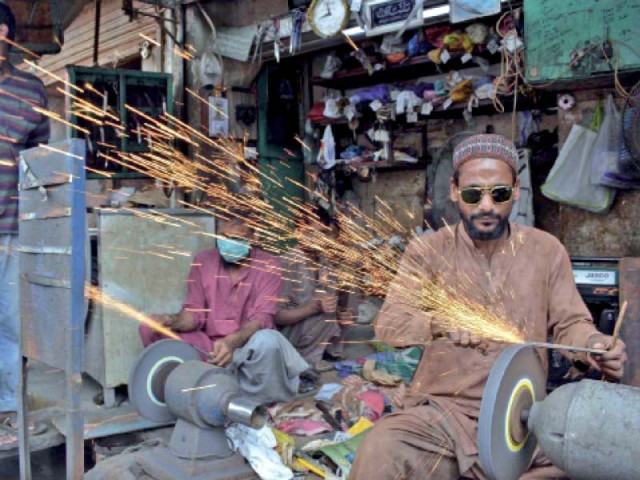Cutting business hours chops knives’ sales
Blacksmiths lament less customer footfall despite Eid, buyers complain of rising prices

Clank! The occasional sound of metal hitting metal, occurring after long gaps, would cut into the unusual silence and darkness that prevailed over Karachi's famous Lohar Bazaar, one of the largest and oldest blacksmiths' markets in the city.
It had not been so in bygone years, especially with Eidul Azha just round the corner. In fact, the market would brim with activity late into the night, the rattle of knives and barbeque grills in the making occurring much more frequently and loudly, creating a cacophony of metallic sounds that told of the religious festival's arrival.
However, all that has been lost to the pandemic.
'Declining sales'
As the government imposed restrictions in the wake of the coronavirus outbreak, limiting business hours for the market, its blacksmiths found themselves at a loss.
The market, which would previously stay open till late night, is now closed much earlier in the evening. Located on MA Jinnah Road, it is houses the shops of over 300 blacksmiths, who usually make the most of Eidul Azha, selling and sharpening knives for slaughtering sacrificial animals. They are masters in the craft and their knives are known for their durability and sharpness even as far away as Balochistan.
According to these blacksmiths, the restrictions on business hours have adversely affected their sales as most customers normally visit the market in the evening and at night.
Though demand for their knives had increased ahead of Eidul Azha, they claimed that despite this, the reduction in business hours has resulted in a decline in sales. This year, the market wore a deserted look with the onset of the evening, they complained.
"As a result, we have little option but to sell knives at last year's prices, even when the price of iron has increased," said one among them. "This is due to reduced business hours, which puts customers at an advantage when bargaining for a lower price," he explained.
'Rising prices'
Customer, however, have complained of a price hike at Lohar Bazaar.
According to customers, the price of iron ore has gone up by Rs50 for each kilogramme. Last year, the same amount was being sold for Rs300 against this year's Rs350, they said, adding that the price of good quality iron, too, had surged to Rs450 per kg.
Hence, the prices of knives, barbeque grills and skewers have risen by 30 per cent, they explained.
Besides, a rise of Rs50 has been reported in the price of palm leaf mats and baskets, which, too, are in demand on Eidul Azha.
These are made in bulk by cottage industry workers in rural Sindh and Balochistan, mostly comprising women, two months ahead of the religious festival. From those remote areas, these commodities are transported to wholesale markets, particularly Lea Market, where vendors purchase them to put them up for sale at their shops.
It has been reported that the wholesale price of a medium-sized palm leaf basket has surged by Rs40 this year. Consequently, a basket that was sold for Rs120 last year is now available for Rs160 to Rs180 in the wholesale market and Rs200 to Rs250 at retail shops.
Similarly, the prices of palm leaf mats have increased to Rs300 to Rs400.
Published in The Express Tribune, July 31st, 2020.


















COMMENTS
Comments are moderated and generally will be posted if they are on-topic and not abusive.
For more information, please see our Comments FAQ